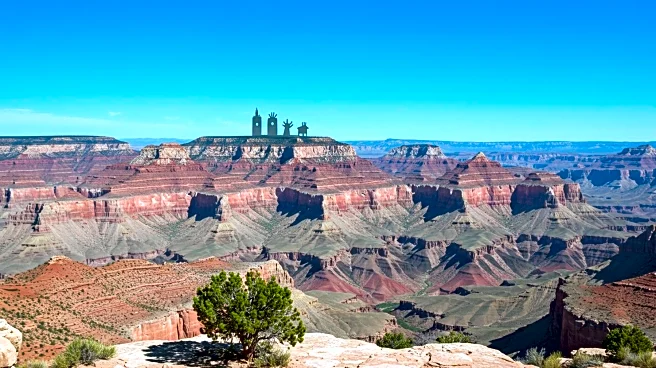What's Happening?
The Grand Canyon is currently under international scrutiny due to uranium mining activities at the Pinyon Plain Mine, located 10 miles south of the national park. This mine has been extracting uranium ore, with over 600 tons already transported through sensitive ecosystems, including areas inhabited by the Navajo Nation and the Hopi Reservation. The transportation of this radioactive material poses significant environmental risks, particularly if accidents occur during transit. Indigenous groups, including the Havasupai Tribe, have voiced strong opposition to the mining operations, citing environmental dangers and the spiritual significance of the Red Butte Traditional Cultural Property. The mine, which began operations under a 1986 permit, continues to operate despite a 2012 ban on new uranium mining efforts in the surrounding area.
Why It's Important?
The ongoing uranium mining near the Grand Canyon has sparked significant controversy due to its potential environmental impact and the lack of consent from indigenous communities. The transportation of radioactive material through sensitive ecosystems raises concerns about potential contamination and long-term ecological damage. Indigenous groups argue that the mining operations threaten their cultural heritage and spiritual sites. The situation highlights broader issues of environmental justice and the need for more stringent regulatory oversight. The continued operation of the mine under outdated permits underscores the challenges of balancing economic interests with environmental and cultural preservation.
What's Next?
There is growing pressure from environmental organizations and indigenous leaders to permanently close the Pinyon Plain Mine. Over 80 environmental groups have called on Arizona's Governor to halt mining activities, citing the lack of tribal consent and outdated legal frameworks. Thousands of signatures have been collected in support of ending uranium mining in the region. The future of the mine remains uncertain, as stakeholders continue to advocate for the protection of the Grand Canyon's ecological and cultural integrity.
Beyond the Headlines
The controversy surrounding the Pinyon Plain Mine reflects broader tensions between resource extraction and environmental conservation. The situation raises ethical questions about the rights of indigenous communities to protect their lands and cultural heritage. It also highlights the need for modernizing regulatory frameworks to address contemporary environmental challenges. The outcome of this dispute could set a precedent for how similar conflicts are managed in the future.












